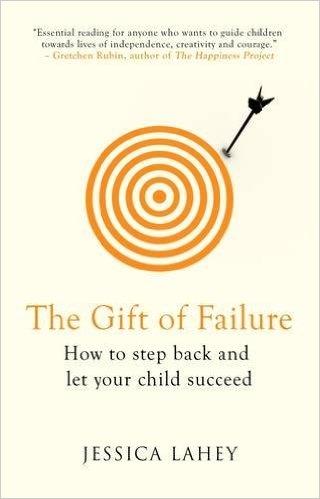The Gift of Failure

“The Gift of Failure: how to step back and let your child succeed” by Jessica Lahey.
Reviewed by Isabelle Regent-Ngwata, mother of 2, Hampshire.
Star rating (4 out of 5) ⭐️⭐️⭐️⭐️
“The setbacks, mistakes, miscalculations and failures we have shoved out of our children’s way are the very experiences that teach them how to be resourceful, persistent, innovative and resilient citizens of this world”
My son recently forgot to pack in his book bag the research he needed to complete a project at school. I spotted the papers in his room. I then lectured him about ‘putting things where they belonged’ and handed them to him before drop off. According to Jessica Lahey, the author of ‘The Gift of Failure’, that was exactly the wrong thing to do.
Lahey’s book is a call to arms for parents to back off. In our quest to provide our children with love, happiness, security and self-confidence, we have taught them that we will always be there to protect them from their mistakes.
Our natural parental instinct to love and provide is amplified by the increasing pressure for the children to succeed both academically and in extra-curricular activities at an ever-earlier age and a culture of fear that keeps our children cooped up and supervised. However, this type of over-parenting is having the opposite effect. Lahey states that “the setbacks, mistakes, miscalculations and failures we have shoved out of our children’s way are the very experiences that teach them how to be resourceful, persistent, innovative and resilient citizens of this world”.
‘The Gift of Failure’ is divided into three parts. First part is the manifesto.
In it, Lahey argues her case for stepping back and draws from research into growth mindset, creativity and resilience to support her argument. This made for compelling – and, yes, uncomfortable reading and was my favourite part of the book.
The second part provides more examples for what stepping back might look like in practice.
It is ambitious in its breadth, both in terms of the age group and the situations it covers. As a result, it spreads itself too thin and comes across as simplistic. Each chapter could have been a book unto itself! The key points are:
- Parents need to provide opportunities for children to develop and demonstrate competence. No matter how uncomfortable, slow and frustrating parents might find the process.
- Friends are key in our children’s development. Free play develops social skills, problem solving and resilience and parents should learn to step back and not intervene too early when conflicts arise, whether for toddlers or primary school age children. For parents of teens, find ways to support but not control your children’s social interactions.
- Sports are supposed to be fun, so ease the pressure on the children: maintain good court-side etiquette, don’t criticise the coach and see failures as opportunity for growth.
- The early teenage years are time to develop executive function skills such as planning, self-organisation, self-control and study skills. “The key to helping kids create the systems they need to gain executive function is to let them fail, let them feel the pain and inconvenience of their mistakes, and then support them in their efforts to rework the bugs”.
- Late adolescents particularly need the leeway to become functioning independents adults.
Lahey is a teacher and Part III focuses on the parent/school relationship.
Our fear of failure undermines education. “Kids need the space to fail, and teachers need the time and benefit of the doubt to let that failure play out in the form of learning.” She dedicates a whole chapter to behaviours that parent ought to adopt to trust and support teachers.
Despite my reservations about Part II, I highly recommend the book. It made me question how I parent my children. It has also encouraged me to apply different strategies (albeit so far very inconsistently!). I have always been fairly relaxed about physical dangers and have given my children space to roam, climb and fail.
My children will probably be better off for learning from their failure. The difficulty is to comply daily and see a child fall behind.
I would love a follow-up book with specific case studies and tips. If my children were taking exams, I would welcome a plan for how to prevent catastrophic failures.
According to Lahey, I should have let my son suffer the consequences of not being able to complete his work. I have since created a checklist of items he is supposed to have ready for school on various days. It is by our back door, for him to use every morning. Next time I spot any forgotten items, I will remind him to check the list and will say no more.
